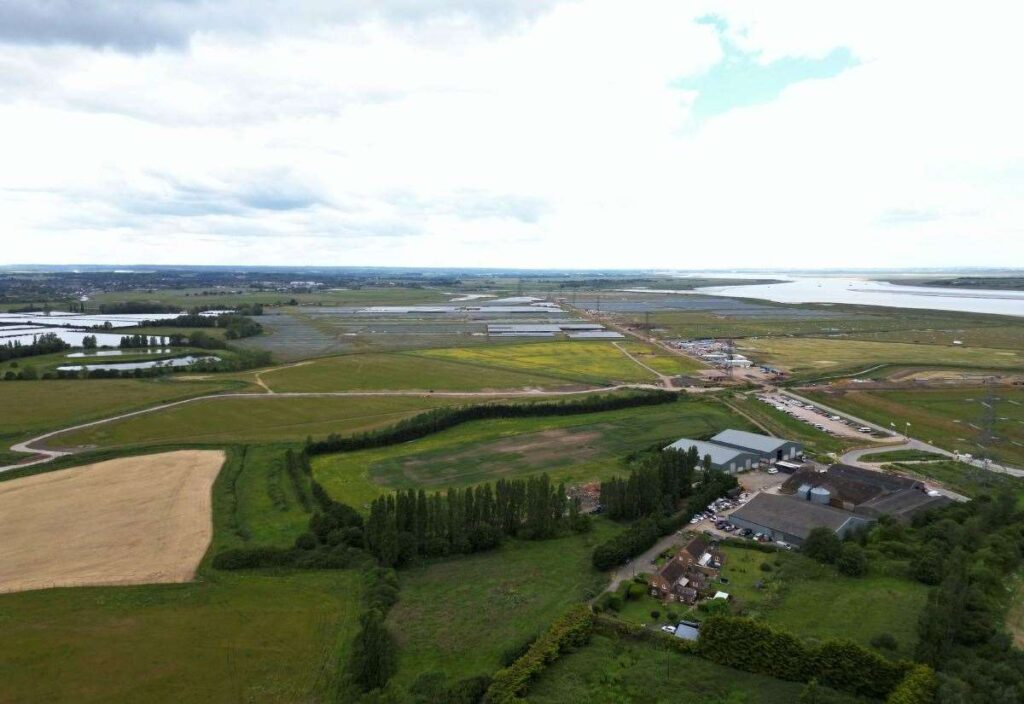A council’s decision to snub proposals for the UK’s biggest solar farm will cost taxpayers “wasted expense,” the government says.
Swale Borough Council (SBC) voted down Cleve Hill Solar Park’s battery safety plans for its massive site in Graveney, near Faversham, despite warnings there was a “high risk there will be costs”.
But its decision was overturned this month after the developers successfully appealed to the Planning Inspectorate, a process expected to cost the taxpayer thousands.
Consisting of 800,000 panels on 890 acres (360 hectares) of farmland, the park was given government approval in May 2020 and is currently under construction.
It means Hive Energy and Wirsol Energy’s hulking solar project, which will generate power for more than 91,000 homes, will move forward despite years of stiff opposition.
The drama unfolded when, earlier this year, SBC went against its expert’s advice and scrapped the energy storage system application – which developers say is crucial for the site to progress.
The battery plan detailed provisions for managing the 20-acre, 150-megawatt battery facility needed at the site to store energy from the solar array.
It described how a fire on one of the 112 cabinets containing lithium ferro phosphate (LFP) batteries would be dealt with, as council reports noted they are “more subject to explosion risk than other types”.
But an independent consultant hired by the council stressed that he was “fully satisfied that the content and protocols were fit for purpose.”
However, on February 28 after almost four hours of debate, SBC’s planning committee refused permission for the battery safety plan.
Planning officers recommended councillors vote the plan through, and stressed there was “substantial risk” of the council losing an appeal and being forced to pay out.
Cleve Hill Solar Park would appeal to the government Planning Inspectorate against the decision, which the inspectorate upheld.
The inspector wrote that the planning committee acted “unreasonably” by refusing the plans against all advice given to them.
“There is very little evidence as to why the advice of these various bodies and the council’s own appointed experts was disregarded,” the Inspector continued.
“Indeed, the unreasonable behaviour I have identified above has directly led to the need for the appeal to take place.
“This could have been avoided. The unreasonable behaviour has led to unnecessary and wasted expense for the applicant in having to pursue the appeal process.”
At the February meeting, many residents expressed fears that an explosion or similar incident could imperil nearby Graveney with toxic fumes or fire.
Cllr James Hunt (Con) also argued against the tide of councillors calling for the plans to be voted down.
Regarding the Inspectorate’s decision he told the Local Democracy Reporting Service (LDRS): “As I mentioned at the meeting we have to go by the policies at the end of the day – there may be things that we as a committee and I personally don’t like – but it’s policy that dictates what should be done.
“When you’ve got planning officers giving a recommendation that something should be approved, and we’ve got the consultants drawing the same conclusion that it should be approved, it’s very difficult to go against that unless you’ve got the evidence to prove otherwise.
“In this case members didn’t have the evidence.
“Financially, councils are really struggling and money for appeals isn’t in any budgets so it has to come from money for elsewhere
“It means the money won’t be there for other things that we do want to do.”
An SBC spokesperson explained: “At this stage a figure has not been agreed, and we will be liaising with the applicant to find out the relevant costs.
“Following the Planning Inspectorate’s decision, the applicant is now able to proceed to implement the permission.”
Cllr Julien Speed (Con), who serves as the Tory environment spokesperson on SBC, said: “This is a shocking decision by the planning inspector”.
“It ticks bureaucratic boxes whilst ignoring the bigger picture. It relies on sub-optimal advice provided by the mandatory consultees and offers no new assurances to residents.”
Cllr Hannah Perkin (Lib Dem), who also sites on SBC’s planning committee, said: “The public campaign to raise the safety concerns of the battery storage unit proposed at Cleve Hill has been so important.
“It feels like the safety concerns for our community have been brushed under the carpet by the Government.
“There is no way that a battery storage safety plan should ever have come to a local council planning committee for consideration, it was completely inappropriate.
“This decision feels like another smack in the face for local democracy.”




